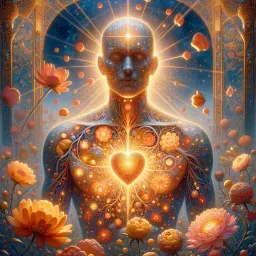You don’t have to be perfect to be amazing

0
0
0
0
- Meaning
- The meaning of this phrase suggests that our value does not hinge on perfection but rather on our unique qualities and contributions. Philosophically, it embraces the idea that human beings are inherently imperfect, which is a fundamental aspect of the human experience. Psychologically, it encourages a growth mindset, recognizing that mistakes and flaws are part of personal development. Historically, movements such as self-acceptance and self-love philosophy back this perspective, focusing on valuing oneself beyond societal standards.
- Allegory
- The elements in the allegorical image symbolize the core message of the phrase. The diverse garden represents the beauty found in uniqueness and imperfection, while the sun signifies warmth and affirmation, encouraging personal growth. The winding path reflects the journey of self-acceptance, emphasizing that embracing flaws leads to a fuller and more amazing existence.
- Applicability
- In personal life, this phrase encourages people to embrace their flaws, focus on self-improvement, and understand that personal growth is a journey filled with learning opportunities rather than perfection. It promotes self-acceptance and resilience in the face of challenges.
- Impact
- The impact of this phrase on culture and society has been significant, particularly in the realms of mental health awareness and personal development. It has inspired discussions about self-acceptance, body positivity, and the importance of embracing individuality over conforming to unrealistic standards of perfection.
- Historical Context
- The exact origin of this phrase is difficult to pinpoint, but it likely emerged in the late 20th century as part of a broader cultural shift towards self-acceptance and mental health awareness, paralleling movements that celebrate individuality and authenticity.
- Criticisms
- While most interpretations of this phrase are positive, some critics argue that embracing imperfection could also lead to complacency or a lack of effort. They might contend that striving for excellence is an important trait, suggesting a balance must be maintained between accepting imperfection and pursuing one's best self.
- Variations
- Variations of this phrase exist in different cultures, emphasizing the celebration of one's uniqueness and flaws. For example, in Japanese culture, the concept of 'Wabi-Sabi' celebrates the beauty of imperfection and transience, emphasizing harmony with imperfection and impermanence.
-

It’s called a hustle, sweetheart.
-

What can I say? I’m a rebel.
-

She warned him not to be deceived by appearances, for beauty is found within.
-

It’s all part of the experience.
-

Your identity is your most valuable possession. Protect it.
-

Seize your moment.
-

Every adventure requires a first step.
-

I’m gonna wreck it!
-

It’s not until you lose everything that you can truly appreciate everything.
-

Now that’s what I call a party!
-

Venture outside your comfort zone. The rewards are worth it.
-

Nobody gets left behind.
No Comments